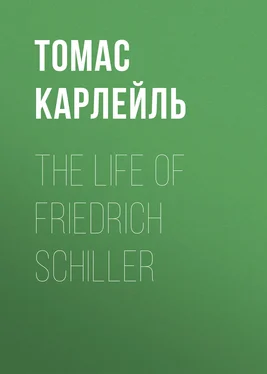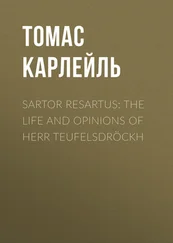Томас Карлейль - The Life of Friedrich Schiller
Здесь есть возможность читать онлайн «Томас Карлейль - The Life of Friedrich Schiller» — ознакомительный отрывок электронной книги совершенно бесплатно, а после прочтения отрывка купить полную версию. В некоторых случаях можно слушать аудио, скачать через торрент в формате fb2 и присутствует краткое содержание. Жанр: Биографии и Мемуары, Философия, foreign_edu, foreign_antique, на английском языке. Описание произведения, (предисловие) а так же отзывы посетителей доступны на портале библиотеки ЛибКат.
- Название:The Life of Friedrich Schiller
- Автор:
- Жанр:
- Год:неизвестен
- ISBN:нет данных
- Рейтинг книги:3 / 5. Голосов: 1
-
Избранное:Добавить в избранное
- Отзывы:
-
Ваша оценка:
- 60
- 1
- 2
- 3
- 4
- 5
The Life of Friedrich Schiller: краткое содержание, описание и аннотация
Предлагаем к чтению аннотацию, описание, краткое содержание или предисловие (зависит от того, что написал сам автор книги «The Life of Friedrich Schiller»). Если вы не нашли необходимую информацию о книге — напишите в комментариях, мы постараемся отыскать её.
The Life of Friedrich Schiller — читать онлайн ознакомительный отрывок
Ниже представлен текст книги, разбитый по страницам. Система сохранения места последней прочитанной страницы, позволяет с удобством читать онлайн бесплатно книгу «The Life of Friedrich Schiller», без необходимости каждый раз заново искать на чём Вы остановились. Поставьте закладку, и сможете в любой момент перейти на страницу, на которой закончили чтение.
Интервал:
Закладка:
King [ after a long pause ].
I have heard you to an end.
Not as in common heads, the world is painted
In that head of yours: nor will I mete you
By the common standard. I am the first
To whom your heart has been disclosed:
I know this, so believe it. For the sake
Of such forbearance; for your having kept
Ideas, embraced with such devotion, secret
Up to this present moment, for the sake
Of that reserve, young man, I will forget
That I have learned them, and how I learned them.
Arise. The headlong youth I will set right,
Not as his sovereign, but as his senior.
I will, because I will. So! bane itself,
I find, in generous natures may become
Ennobled into something better. But
Beware my Inquisition! It would grieve me
If you—
Mar. Would it? would it?
King [ gazing at him, and lost in surprise ].
Such a mortal
Till this hour I never saw. No, Marquis!
No! You do me wrong. To you I will not
Be a Nero, not to you. All happiness
Shall not be blighted by me: you yourself
Shall be permitted to remain a man
Beside me.
Mar. [ quickly ] And my fellow-subjects, Sire?
Oh, not for me , not my cause was I pleading.
And your subjects, Sire?
King. You see so clearly
How posterity will judge of me; yourself
Shall teach it how I treated men so soon
As I had found one.
Mar. O Sire! in being
The most just of kings, at the same instant
Be not the most unjust! In your Flanders
Are many thousands worthier than I.
'Tis but yourself,—shall I confess it, Sire?—
That under this mild form first truly see
What freedom is.
King [ with softened earnestness ].
Young man, no more of this.
Far differently will you think of men,
When you have seen and studied them as I have.
Yet our first meeting must not be our last;
How shall I try to make you mine?
Mar. Sire, let me
Continue as I am. What good were it
To you, if I like others were corrupted?
King. This pride I will not suffer. From this moment
You are in my service. No remonstrance!
I will have it so. * * * * *
Had the character of Posa been drawn ten years later, it would have been imputed, as all things are, to the 'French Revolution;' and Schiller himself perhaps might have been called a Jacobin. Happily, as matters stand, there is room for no such imputation. It is pleasing to behold in Posa the deliberate expression of a great and good man's sentiments on these ever-agitated subjects: a noble monument, embodying the liberal ideas of his age, in a form beautified by his own genius, and lasting as its other products. 16 16 Jean Paul nevertheless, not without some show of reason, has compared this Posa to the tower of a lighthouse: 'high, far-shining,—empty!' ( Note of 1845. )
Connected with the superior excellence of Posa, critics have remarked a dramatic error, which the author himself was the first to acknowledge and account for. The magnitude of Posa throws Carlos into the shade; the hero of the first three acts is no longer the hero of the other two. The cause of this, we are informed, was that Schiller kept the work too long upon his own hands:
'In composing the piece,' he observes, 'many interruptions occurred; so that a considerable time elapsed between beginning and concluding it; and, in the mean while, much within myself had changed. The various alterations which, during this period, my way of thinking and feeling underwent, naturally told upon the work I was engaged with. What parts of it had at first attracted me, began to produce this effect in a weaker degree, and, in the end, scarcely at all. New ideas, springing up in the interim, displaced the former ones; Carlos himself had lost my favour, perhaps for no other reason than because I had become his senior; and, from the opposite cause, Posa had occupied his place. Thus I commenced the fourth and fifth acts with quite an altered heart. But the first three were already in the hands of the public; the plan of the whole could not now be re-formed; nothing therefore remained but to suppress the piece entirely, or to fit the second half to the first the best way I could.'
The imperfection alluded to is one of which the general reader will make no great account; the second half is fitted to the first with address enough for his purposes. Intent not upon applying the dramatic gauge, but on being moved and exalted, we may peruse the tragedy without noticing that any such defect exists in it. The pity and love we are first taught to feel for Carlos abide with us to the last; and though Posa rises in importance as the piece proceeds, our admiration of his transcendent virtues does not obstruct the gentler feelings with which we look upon the fate of his friend. A certain confusion and crowding together of events, about the end of the play, is the only fault in its plan that strikes us with any force. Even this is scarcely prominent enough to be offensive.
An intrinsic and weightier defect is the want of ease and lightness in the general composition of the piece; a defect which, all its other excellencies will not prevent us from observing. There is action enough in the plot, energy enough in the dialogue, and abundance of individual beauties in both; but there is throughout a certain air of stiffness and effort, which abstracts from the theatrical illusion. The language, in general impressive and magnificent, is now and then inflated into bombast. The characters do not, as it were, verify their human nature, by those thousand little touches and nameless turns, which distinguish the genius essentially dramatic from the genius merely poetical; the Proteus of the stage from the philosophic observer and trained imitator of life. We have not those careless felicities, those varyings from high to low, that air of living freedom which Shakspeare has accustomed us, like spoiled children, to look for in every perfect work of this species. Schiller is too elevated, too regular and sustained in his elevation, to be altogether natural.
Yet with all this, Carlos is a noble tragedy. There is a stately massiveness about the structure of it; the incidents are grand and affecting; the characters powerful, vividly conceived, and impressively if not completely delineated. Of wit and its kindred graces Schiller has but a slender share: nor among great poets is he much distinguished for depth or fineness of pathos. But what gives him a place of his own, and the loftiest of its kind, is the vastness and intense vigour of his mind; the splendour of his thoughts and imagery, and the bold vehemence of his passion for the true and the sublime, under all their various forms. He does not thrill, but he exalts us. His genius is impetuous, exuberant, majestic; and a heavenly fire gleams through all his creations. He transports us into a holier and higher world than our own; everything around us breathes of force and solemn beauty. The looks of his heroes may be more staid than those of men, the movements of their minds may be slower and more calculated; but we yield to the potency of their endowments, and the loveliness of the scene which they animate. The enchantments of the poet are strong enough to silence our scepticism; we forbear to inquire whether it is true or false.
The celebrity of Alfieri generally invites the reader of Don Carlos to compare it with Filippo . Both writers treat the same subject; both borrow their materials from the same source, the nouvelle historique of St. Réal: but it is impossible that two powerful minds could have handled one given idea in more diverse manners. Their excellencies are, in fact, so opposite, that they scarcely come in competition. Alfieri's play is short, and the characters are few. He describes no scene: his personages are not the King of Spain and his courtiers, but merely men; their place of action is not the Escurial or Madrid, but a vacant, objectless platform anywhere in space. In all this, Schiller has a manifest advantage. He paints manners and opinions, he sets before us a striking pageant, which interests us of itself, and gives a new interest to whatever is combined with it. The principles of the antique, or perhaps rather of the French drama, upon which Alfieri worked, permitted no such delineation. In the style there is the same diversity. A severe simplicity uniformly marks Alfieri's style; in his whole tragedy there is not a single figure. A hard emphatic brevity is all that distinguishes his language from that of prose. Schiller, we have seen, abounds with noble metaphors, and all the warm exciting eloquence of poetry. It is only in expressing the character of Philip that Alfieri has a clear superiority. Without the aid of superstition, which his rival, especially in the catastrophe, employs to such advantage, Alfieri has exhibited in his Filippo a picture of unequalled power. Obscurity is justly said to be essential to terror and sublimity; and Schiller has enfeebled the effect of his Tyrant, by letting us behold the most secret recesses of his spirit: we understand him better, but we fear him less. Alfieri does not show us the internal combination of Filippo: it is from its workings alone that we judge of his nature. Mystery, and the shadow of horrid cruelty, brood over his Filippo: it is only a transient word or act that gives us here and there a glimpse of his fierce, implacable, tremendous soul; a short and dubious glimmer that reveals to us the abysses of his being, dark, lurid, and terrific, 'as the throat of the infernal Pool.' Alfieri's Filippo is perhaps the most wicked man that human imagination has conceived.
Читать дальшеИнтервал:
Закладка:
Похожие книги на «The Life of Friedrich Schiller»
Представляем Вашему вниманию похожие книги на «The Life of Friedrich Schiller» списком для выбора. Мы отобрали схожую по названию и смыслу литературу в надежде предоставить читателям больше вариантов отыскать новые, интересные, ещё непрочитанные произведения.
Обсуждение, отзывы о книге «The Life of Friedrich Schiller» и просто собственные мнения читателей. Оставьте ваши комментарии, напишите, что Вы думаете о произведении, его смысле или главных героях. Укажите что конкретно понравилось, а что нет, и почему Вы так считаете.












